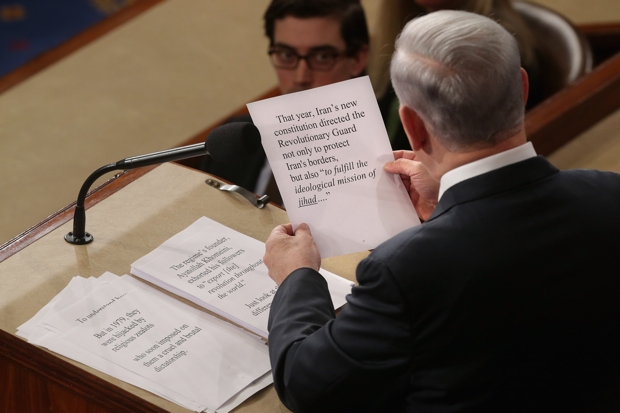For weeks before his plane set off for Washington, Benjamin Netanyahu’s speech to the US Congress was exhaustingly analysed here in DC. Did Speaker Boehner adequately notify the White House about the invitation? How angry was the President really about this fait accompli? Were the Republicans using the invite to try to show themselves to be more pro-Israel than their Democrat rivals? Or were certain Democrats talking of no-shows and walk-outs during the speech only in order to show themselves more critical of Israel than the Republicans? By the day of the speech it seemed both sides had need of the fight.
Of course Netanyahu had not single-handedly created this problem. As any member of Congress will tell you, the House has never been more divided, nor its partisan atmosphere more toxic. Democrats feel the office of the President is being slighted by Republicans while Republicans accuse Obama of fundamentally transforming America and now of hanging their best regional ally out to dry. Yet above such party politics the major point of concern was that the casualty in all this – irrespective of who was propelling it more – would be the historically bipartisan nature of pro-Israel support in Washington.
Of course cynics pointed out that Netanyahu has a domestic election to win. But his speech undoubtedly had a far more important overarching purpose than that. Both in opposition and government Netanyahu has spent many years warning of the consequences of a nuclear-armed Iran. Now that the P5+1 seem once again to be close to a deal which could allow Iran to enrich uranium while further normalising trade relations with the country, the point of Netanyahu’s speech was to warn America of the irreversible consequences of a bad nuclear deal.
The speech itself was typically impressive in content and rhetoric. Netanyahu summed up the 36 years of terror that the Ayatollahs have imposed on Iran and around the world since seizing power in 1979. He surveyed the situation in which to defeat Isis, America and others were getting too close to a regime which (with the possible exception of North Korea) is the most anti-Western regime on earth. He lambasted Iran for demanding to be treated normally while sponsoring global terror and regional instability as well as constantly promising to annihilate the world’s only Jewish state. He argued that while Iran was ostensibly claiming to be assisting regional stability it was actually using that instability to gobble up Iraq, Syria, Lebanon and Yemen. As he warned Congress, sometimes ‘The enemy of your enemy is your enemy.’
But it was the prospect of the nuclear deal allowing Iran to develop nuclear weapons that dominated the speech. As Netanyahu said, ‘to defeat Isis and allow Iran the bomb would be to win a battle and lose the war.’
The White House were straight in with their counter-attack, briefing before the speech had even ended that it was all rhetoric and nothing new. Senior Democrats came out to say that they didn’t need ‘lectures’ from Netanyahu. Back at home, Netanyahu’s domestic political rivals bemoaned the damage they said Netanyahu had done to the bipartisan pro-Israel cause.
Yet the sight of the entirety of the US Congress applauding and giving ovation after ovation to Netanyahu’s warnings on a bad nuclear deal was a strong signal. It may very well make it harder for the administration to push through a bad deal. But at the same time the lack of anything very new in the Prime Minister’s speech could make all but the most devout admirer of Netanyahu nervous. Certainly the speech drew a line in the sand. But at what cost?
Some very pro-Israel Democrats were deeply stung by all this. If the speech had to appeal to anyone it had to appeal to them and conversations with those Democrats suggest that it failed on that account. In any case, if Washington rumours are true that Secretary of State John Kerry is finding it impossible to reach a deal with the Iranians then the game was not worth its risks since its intended aim would have been fulfilled with or without it.
So was the damage done worth the message delivered? It is impossible to judge at this remove. If a deal is teetering and Netanyahu’s intervention helped pull the Americans back then he may have helped save the Middle East from the imminence of a nuclear Iran followed by regional nuclear escalation and the constant threat of nuclear Armageddon in the Middle East. Or the nature of the speech combined with the President’s apparent Nixon-China sense of his role in all this could have persuaded Obama to push ahead with what Netanyahu would consider a bad deal in spite of what the Israeli Prime Minister thinks. Before Netanyahu went to Washington each side was gearing up for a major, historic victory. For the time being they will have to console themselves with what looks, for now, like a draw.







Comments